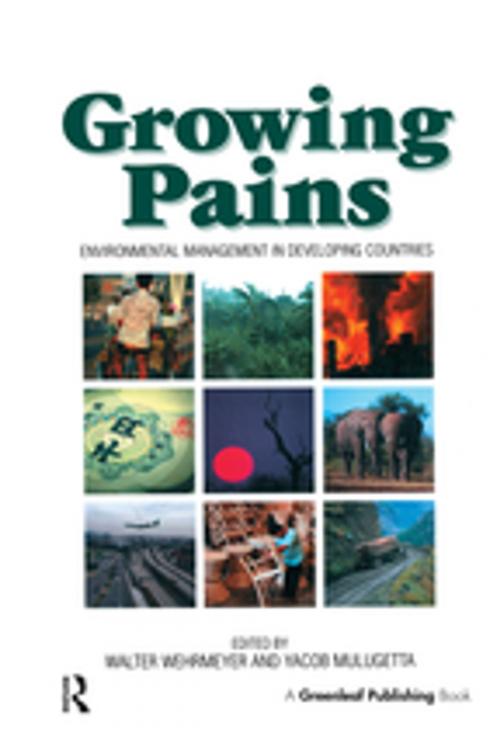Growing Pains
Environmental Management in Developing Countries
Business & Finance, Business Reference, Business Ethics, Management & Leadership, Management| Author: | ISBN: | 9781351283106 | |
| Publisher: | Taylor and Francis | Publication: | October 19, 2017 |
| Imprint: | Routledge | Language: | English |
| Author: | |
| ISBN: | 9781351283106 |
| Publisher: | Taylor and Francis |
| Publication: | October 19, 2017 |
| Imprint: | Routledge |
| Language: | English |
Environmental management is a global phenomenon, embracing all businesses in all countries, whether or not there already exists an organised response to managing environmental impacts.
Today, there are gross inequalities between the world's richest and poorest nations in terms of income distribution, consumption patterns, access to resources and environmental impact. Yet both the developed north and the developing south are committed, at least in words, to achieving sustainable development.
Public awareness of environmental issues in the North has been rising in recent years and further degradation is now largely minimized through more stringent regulatory regimes, voluntary agreements and growing consumer and stakeholder pressure on corporations. Still, the north is continuing to lead an environmentally unsustainable lifestyle as environmental improvements are nullified by overall increases in consumption levels. In the south, a billion people still do not have access to the most basic needs. Poor countries need to accelerate their consumption growth if they are to ensure that the lives of their people are enriched. However, with rapid economic growth and corresponding increases in consumption now under way, their environmental impact is soon to become substantially greater. In a world that strives towards stemming global crises such as climate change, the path already taken by the rich and high-growth economies over the past century cannot be repeated by the south if the desired objective is to create a future that is truly sustainable.
Growing Pains examines environmental management in the south from a number of perspectives. It is designed to stimulate the discussion about the role that corporations and national and international organizations play in sustainable development. It does not offer panaceas, as each country has its own problems and opportunities; and, after almost 50 years of failed panacea-oriented economic development policy transfer from the north to the south, it is time to abandon hope for universal solutions and instead look to individual approaches that work.
The book is divided into five themes: globalization; the role of business; a focus on national strategies; trade and the environment; and the organizational and structural challenges of sustainable development.
With contributions from an outstanding collection of authors in both the developed and developing worlds including UNIDO; the Thailand Environment Institute, Arthur D. Little, Inc., Shell Peru; IUCN, the Russian Academy of Sciences and IIED, this important and unique new book presents a body of work that will provide essential reading for businesses working in developing countries, environmental and developmental NGOs and researchers engaged in the debate and sharing of best practice in this increasingly critical subject area.
Environmental management is a global phenomenon, embracing all businesses in all countries, whether or not there already exists an organised response to managing environmental impacts.
Today, there are gross inequalities between the world's richest and poorest nations in terms of income distribution, consumption patterns, access to resources and environmental impact. Yet both the developed north and the developing south are committed, at least in words, to achieving sustainable development.
Public awareness of environmental issues in the North has been rising in recent years and further degradation is now largely minimized through more stringent regulatory regimes, voluntary agreements and growing consumer and stakeholder pressure on corporations. Still, the north is continuing to lead an environmentally unsustainable lifestyle as environmental improvements are nullified by overall increases in consumption levels. In the south, a billion people still do not have access to the most basic needs. Poor countries need to accelerate their consumption growth if they are to ensure that the lives of their people are enriched. However, with rapid economic growth and corresponding increases in consumption now under way, their environmental impact is soon to become substantially greater. In a world that strives towards stemming global crises such as climate change, the path already taken by the rich and high-growth economies over the past century cannot be repeated by the south if the desired objective is to create a future that is truly sustainable.
Growing Pains examines environmental management in the south from a number of perspectives. It is designed to stimulate the discussion about the role that corporations and national and international organizations play in sustainable development. It does not offer panaceas, as each country has its own problems and opportunities; and, after almost 50 years of failed panacea-oriented economic development policy transfer from the north to the south, it is time to abandon hope for universal solutions and instead look to individual approaches that work.
The book is divided into five themes: globalization; the role of business; a focus on national strategies; trade and the environment; and the organizational and structural challenges of sustainable development.
With contributions from an outstanding collection of authors in both the developed and developing worlds including UNIDO; the Thailand Environment Institute, Arthur D. Little, Inc., Shell Peru; IUCN, the Russian Academy of Sciences and IIED, this important and unique new book presents a body of work that will provide essential reading for businesses working in developing countries, environmental and developmental NGOs and researchers engaged in the debate and sharing of best practice in this increasingly critical subject area.















